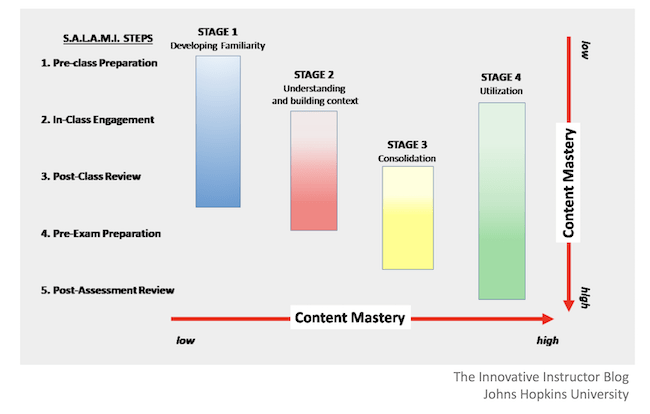Dr. James Culhane’s Evidence-Based Approach to Studying
One of my biggest axes to grind about the state of education in America is that we do not teach smart people how to study. This is especially true in the medical and health sciences regarding med students, physicians, veterinarians, Pharm Ds, etc.
One of my favorite people to talk about this issue with is Dr. Jim Culhane, professor and chair of the Department of Pharmaceutical Sciences at Notre Dame of Maryland University School of Pharmacy.
When I say “talk about,” I don’t mean complain. I mean, we talk about the student profile patterns for those who struggle, what we can do as educators to intervene, and what the literature says to support these methods.
Dr. Culhane recently wrote a great blog on Johns Hopkins University’s Innovative Instructor Blog about the study-based issues he sees with his Pharm D students and then talks about his own process for fixing this. He calls it the S.A.L.A.M.I method, and it provides a step-by-step framework for addressing the study issues we always talk about.

If you want to find out what S.A.L.A.M.I. stands for (and you should!), read the article. It is every bit as good of a backronym as the Marvel Cinematic Universe’s backronym for S.H.I.E.L.D (Strategic Homeland Intervention, Enforcement and Logistics Division).
But a few points I wanted to highlight from the blog post are:
1.) PROVIDE A SYSTEM FOR STUDYING: While his system is different that the method we teach in STATMed, it is absolutely a viable approach to empower both students and advisors. There is not perfect system at this level. But we need to break down the vagaries of learning and provide discrete steps with tools along with sequence and rationales. This is exactly what S.A.L.A.M.I provides.
2.) COMMON ADVICE FOR STRUGGLING STUDENTS: Frustrating advice for the struggling student in medical or health science education is pretty common, I’m afraid. It must in part be related to the fact that we do not have a cultural awareness that methodology matters when studying and what those methods are. Here are two great quotes from the post:
We often evaluate students’ formative or summative “performances” with grades, written or verbal feedback. But what type of feedback do we give them to help improve the efficacy of their preparation for those “performances?”
If we do give them feedback about how to improve their learning process, is it evidenced-based and directed at improving metacognition, or do we simply tell them they need to study harder or join a study group in order to improve their learning?
Obviously, in my experience, frustrated students often cite the latter as the advice they have been given: Are you making a schedule? Are you dedicating enough time? Are you really working hard enough? Are you using the right resources? Etc. Instead, Dr. Culhane proposes the assessment of process and then the introduction of best practices … which will also help with the elimination of poor practices when studying.
3) TOOLS (!): The blog links to two specific, in-depth tools created by Dr. Culhane:
- Pre-Exam Checklist
- Exam Wrapper
Both are robust, complex tools that elicit organized and externalized metacognition about test prep, including study methods (Pre-Exam Checklist), and analysis and reflection of test performance to pinpoint what works and what did not work (Exam Wrapper). You can download these directly from his blog, so check it out. These types of external and explicit tools must be taught to students who are struggling to unlock their potential!
4) ILLUSIONS OF LEARNING: Ah, one of our favorite talking points. He cites two of these illusions in particular
- The ‘illusion of knowledge’: Where the learners are familiar but not precisely sure of dense information … a status that may serve someone well in undergrad but is toxic at the doctoral level
- The ‘illusion of productivity’: Where you think because you are spending time on a topic, toiling away, that it is therefore giving you yield. But just like how not all exercise is the same, not all studying is the same.
I think all of our students, especially our med and health science students, should know these names of these phenomena, and be able to identify them. Only through naming these issues and strategies can we help students have more agency over their study process and study outcomes.
